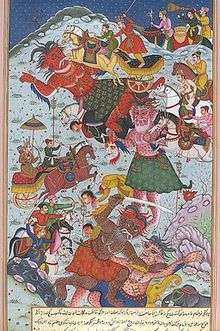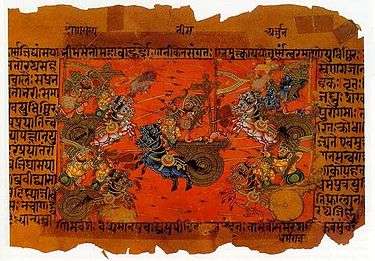Ghatotkacha
| Ghatotkacha | |
|---|---|
|
Mahabharata | |
 A mughal depiction of Ghatotkacha (top) getting killed by Karna (top left) | |
| Information | |
| Parent(s) |
Bhima Hidimbi |
Ghatotkacha (Sanskrit: घटोत्कच Ghaṭōtkaca "Bald Pot") is an important character in the Mahabharata.[1] His name comes from his head, which was hairless (utkaca) and shaped like a ghatam.[2] Ghatotkacha was the son of Bhima and Hidimbi, a rakshasi.
Ghatotkacha is the father of Barbarika, Anjanaparvan, and Meghavarna. Only Anjanaparvan participated in the war.
His maternal parentage made him half-Rakshasa and gave him many magical powers such as the ability to fly, to increase or decrease his size and to become invisible. He was an important fighter from the Pandava side in the Kurukshetra war.
Mahabharata

Ghatotkacha was born to Hidimbi and the Pandava Bhima. When traveling the countryside with his brothers and mother as a brahmin, having escaped the lakshagraha, Bhima saved Hidimbi from her wicked brother Hidimba, the king of demons of Kamyaka. Soon after Ghatotkacha was born, Bhima had to leave his family, as he still had duties to complete at Hastinapura. Ghatotkacha grew up under the care of Hidimbi. Like his father Ghatotkacha primarily fought with the mace. Lord Krishna gave him a boon that no one in the world would be able to match his sorcery skills (except Krishna himself).[3] His wife was Ahilawati and his sons were Barbarika, Anjanaparvan, and Meghvarna.
Hidimbi's dinner request
One day Hidimbi asks Ghatotkacha to bring a human for her dinner. On the way, he saw a Brahmin and his wife going somewhere with their three children. Ghatotkacha went to them and asked that any one of them should come with him for his Mother's dinner. The Brahmin offered himself but his wife insisted that she wants to go. At last their second son agreed to go with Ghatotkacha and asked his permission to have a bath in the river Ganga. After a few hours, Ghototkacha starts looking for the boy and screams calling him as Madhyama. Bhima hears the scream and enquires as to what is the matter. Ghatotkacha then narrates everything to Bhima who agrees to go with him on one condition -That Ghatotkacha defeats him in a fight.
Fight with Bhima
The fight begins with both father and son fighting barehanded. After days of fighting both of them got tired and were interrupted by Hidimbi who stops the fight between the two equally strong warriors. Hidimbi tells Ghatotkacha that Bhim is his father and Ghatotkacha upon hearing this, falls at the feet of his Father Bhima who then embraces his son and tells him that seldom has he fought anyone who could match him in terms of strength. At the same time, he rebukes his son and wife for their practice of eating humans.
Kurukshetra War
In the Mahābhārata, Ghatotkacha was summoned by Bhima to fight on the Pandava side in the Kurukshetra battle. Invoking his magical powers, he wrought great havoc in the Kaurava army. During his first summon he caused terrible damage to the side of kuru force, using his power of maya (illusion) and transformation seeing him all warriors like Duryodhana, Karna fled away only the proud son of Drona stood fearlessly. With his light-handiness he destroyed all of Bhimsena son illusion and made him unconscious. Later on gaining his senses Ghatotkacha furious and filled with rage again fought with proud son of Drona. During this fight both used their celestial weapons but the mighty asura wasn't able to withstand the shafts of Drona son so was made to flee away.
After the death of Jayadratha on the fourteenth day of battle, when the battle continued on past sunset, as per Krishna advice Ghatotkacha was called and was told to slay Karna as the latter was havocing the Pandu force. His powers were at their most effective at night as Rakshasa become (at such an hour) endued with unlimited prowess, great might, and great courage. Along with his asura troops Gatotkacha attacked over Kauravas army. Then a fight took place between Karna and Bhimsena son, after seeing his effort cannot prevail over that gigantic asura Karna invoked his celestial weapons. Beholding a celestial weapon aimed at him, the foremost of all Rakshasas used his illusion to surrounded the Kaurava army. Beholding that, all kings with their sons and combatants, fled in fear. Only one amongst them, viz., Kama, proud of the power of his weapons, and feeling a noble pride, trembled not and destroyed all of Gatotkacha invoked illusions. Later on when Gatotkacha couldn't prevail over Karna, he invoked a fierce and terrible illusion into existence. Using his deceitful means of fighting along with invisibility he started to destroy Kaurava force with showers of weapons what Karna failed to destroy. At this point in the battle, seeing his army in pain and hearing loud cries saying 'O Kama, slay the Rakshasa soon with thy dart' he invoked into existence that terrible missile(Vasava) which he had kept and adored for years for slaughtering Pandu son in battle. Seeing Karna holding blazing weapon capable of piercing the body of every foe, the Rakshasa began to fly away in fear. Fierce winds began to blow, and thunders with loud report began to fall on the earth, as Karna hurled that weapon at the Rakshasa destroying his illusion and piercing him it returned back to Indra. Mortally wounded, Ghatotkacha fell to the ground growing his size while dying he crushed one akshauhini of the Kaurava army by his weight benefitting Pandavas.[4] After his death Pandavas filled with grief while Vaudeva began to dance as Karna could no longer has his dart. As to remove Arjuna confusion "Vasudeva said ,' By good luck, his (natural) armour, ear-rings and his infallible dart also is now baffled. Clad in (natural) coat of mail and decked with his (natural) ear-rings, Kama, who had his senses under control, could singly vanquish the three worlds with the very gods. Neither Vasava, nor Varuna the lord of the waters, nor Yama, could venture to approach him. Indeed, if that bull among men had his armour and ear-rings, neither thyself, bending thy Gandiva, nor myself, uplifting my discus, called Sudarsana, could vanquish him in battle. For thy good, Kama was divested of his ear-rings by Sakra with the help of an illusion. Kama now seems to me to be like an angry snake of virulent poison stupefied by power of incatation, or like a fire of mild flames.[5]

In popular culture
- There is a temple built in Champawat, Uttrakhand where it is meant his head fell after he was killed by Karna in battle of Mahabharata.
- There is a temple built to honor Ghatotkacha in Manali, Himachal Pradesh near the Hidimba Devi Temple.
In Media
- A 2008 animated film Ghatothkach was based on his life. It was directed by Singeetham Srinivas Rao.[6]compared to the original source he survives
- Ketan Karande played Ghatotkacha in 2013 TV Series Mahabharat.
- Razaq Khan played Ghatotkacha in 1988 TV Series Mahabharat.
- Ghatothkacha is a playable Character in the game Mobile Legends: Bang Bang.
See also
References
- ↑ Datta, Amaresh (2006-01-01). "The Encyclopaedia of Indian Literature (Volume Two) (Devraj to Jyoti)". ISBN 978-81-260-1194-0.
- ↑ "Archived copy". Archived from the original on 10 January 2007. Retrieved 3 December 2006.
- ↑ Dutt, Romesh. "Maha-Bharata, The Epic of Ancient Indi". Missing or empty
|url=(help) - ↑ Amar Chitra Katha #592, ISBN 9788184821994
- ↑ www.wisdomlib.org (2015-01-10). "The Death of Ghatotkacha [Chapter 10]". Wisdom Library. Retrieved 2017-03-16.
- ↑ http://www.rediff.com/movies/report/ssg/20080512.htm
External links
| Wikimedia Commons has media related to Ghatotkacha. |
